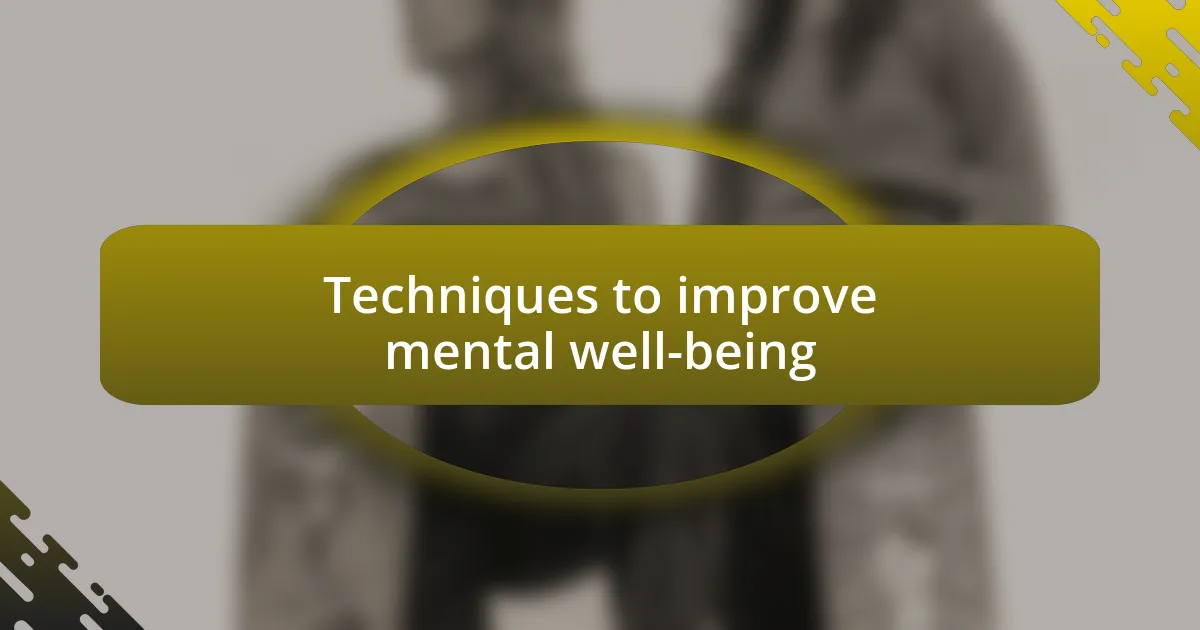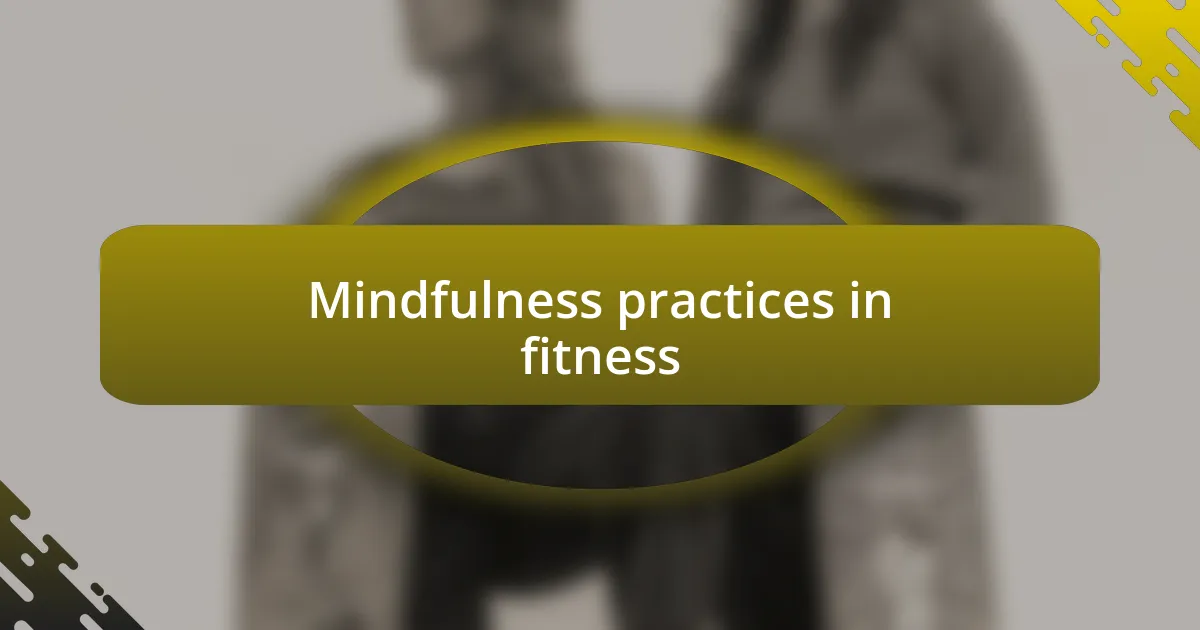Key takeaways:
- Mental health significantly influences motivation and self-care, creating a feedback loop that can be disrupted with awareness.
- Physical fitness is crucial for mental health, enhancing mood, reducing anxiety, and improving self-esteem and energy levels.
- Practices such as mindfulness, journaling, and maintaining a consistent sleep routine are effective techniques for improving mental well-being.
- Nutritional choices, hydration, and mindful eating play vital roles in maintaining mental clarity and emotional stability.

Understanding mental health impact
Understanding the impact of mental health goes beyond just recognizing its existence; it’s about feeling its ripples in everyday life. I remember a time when I was overwhelmed by anxiety, and even simple tasks felt monumental. It made me wonder—how can something so invisible affect my ability to function so profoundly?
When I began to notice how my mood fluctuated, it became clear that my mental health directly influenced my motivation to work out and take care of my body. I often found myself dragging my feet to the gym when I was low, asking, “Why even bother?” This pushed me to realize that mental health isn’t just about feeling sad or stressed; it’s intertwined with every choice we make, especially regarding our physical well-being.
Reflecting on my journey, I’ve learned that understanding mental health impact is crucial for motivation and self-care. It’s like a beacon that guides us toward better choices. Have you ever paused to think about how a bad day can make you skip your workout, which then feeds into a cycle of feeling worse? It’s a feedback loop that we can break with awareness and support.

Importance of physical fitness
Physical fitness plays a pivotal role in managing mental health. I vividly remember the first time I returned to running after a long hiatus. With each step, I felt a surge of endorphins, those little mood boosters, flooding my system. It was like a reset button for my mind, allowing me to leave behind the stressors that had been weighing heavily on my thoughts. This simple activity reminded me that physical health is intricately linked to mental wellness.
Here are some key reasons why physical fitness is essential for mental health:
- Improved Mood: Exercise releases chemicals in the brain that help improve mood and reduce feelings of depression.
- Reduced Anxiety: Physical activity can lower stress hormones, leading to a calmer mindset.
- Enhanced Self-Esteem: Achieving fitness goals, no matter how small, boosts confidence and self-worth.
- Increased Energy Levels: Regular activity can combat fatigue, making daily tasks feel less daunting.
- Better Sleep: Exercise often improves sleep quality, which directly affects mental clarity and emotional balance.
Engaging in fitness is more than just a physical endeavor; it has been my lifeline during tougher times. It’s a gentle reminder that taking care of my body can also nurture my mind. Each workout became a testament to my resilience, proving that even on the most challenging days, I could still find strength within myself.

My fitness journey details
My fitness journey has been a revealing experience, full of ups and downs that reflect my mental state. I still vividly recall the first yoga class I attended; I was anxious and unsure. But the moment I stepped onto that mat and focused on my breath, it was as if I was letting go of a weight I didn’t even know I was carrying. Each stretch and pose felt like therapy, helping me connect with my body and calm my mind.
Another highlight of this journey has been my consistent commitment to strength training. At first, I was intimidated by the weights, fearing judgment from others. However, as I became stronger—both physically and mentally—I realized that each lifted weight represented a challenge I was overcoming. I began to embrace not just the physical transformations but also the mental fortitude I was building. This perspective has profoundly shifted how I view challenges in everyday life.
Now, I also make time for outdoor activities like hiking. The combination of fresh air, physical exertion, and the beauty of nature offers a unique therapeutic experience. On a memorable hike last summer, I experienced a moment of clarity while reaching a summit, overlooking the vast landscape. It reminded me that persistence leads to reward, both in fitness and in managing my mental health. It’s this realization that keeps pushing me forward on my fitness journey.
| Fitness Activity | Emotional Insight |
|---|---|
| Running | Feelings of liberation with each step |
| Yoga | A calming escape from anxiety |
| Strength Training | Building confidence through physical strength |
| Hiking | Moments of clarity and perspective |

Techniques to improve mental well-being
Practicing mindfulness has been a game changer for my mental well-being. I remember a particularly hectic week where everything felt overwhelming; it was during this time I discovered guided meditation. Taking just ten minutes each morning to sit quietly and focus on my breath created a space for me to process my thoughts and feelings. It’s fascinating how just a small moment of stillness can shift your entire perspective, isn’t it?
Additionally, journaling has proven to be an effective outlet for me. I started keeping a daily log of my thoughts and emotions, and it felt like I was having a conversation with myself. Through writing, I discovered recurring themes in my worries, which helped me to address them more honestly. Have you ever tried putting your feelings on paper? I found that by organizing my thoughts, I could confront my anxieties with clarity and, ultimately, let them go.
I’ve also found great strength in establishing a consistent sleep routine. There was a period when my sleep schedule was erratic, and I noticed a direct impact on my mood and overall mental health. By prioritizing seven to eight hours of quality sleep each night, I felt like a new person. Would you believe that something so simple could transform your mental state? It truly makes a difference in how I handle stress and engage with the world around me.

Nutrition’s role in mental health
Nutrition plays a pivotal role in mental health, and my own journey has highlighted its significance. I remember a time when I was feeling particularly low; I noticed that my diet consisted mainly of processed foods and sugary snacks. It was a wake-up call when I learned about the connection between nutrients like omega-3 fatty acids and mood regulation. Making the switch to a more balanced diet that included fish, nuts, and plenty of vegetables left me feeling more energized and emotionally stable. Have you ever felt the difference a meal can make in your mood?
I’ve also discovered that staying hydrated is crucial for maintaining mental clarity. I used to underestimate the power of water, thinking it was just a basic need. However, during particularly stressful times, I made a conscious effort to drink more water. The results were astonishing; I noticed a reduction in anxiety levels and an overall improvement in my focus. I found myself asking, “Could something as simple as water really impact my mindset?” The answer was a resounding yes.
Finally, I’ve come to understand the importance of mindfulness in eating. Mindful eating, where I truly savor each bite and pay attention to how my body feels, has been transformative. I used to rush through meals, barely tasting anything. Now, taking the time to enjoy and appreciate my food not only enhances my relationship with what I eat but also contributes to a more positive mindset. Have you tried this approach? It’s incredible how tuning into the experience of eating can shift your mental landscape.

Mindfulness practices in fitness
Mindfulness practices in fitness have become a cornerstone of my routine. I remember starting yoga as a way to improve my flexibility, but what I gained was so much more. Each session became an opportunity for me to connect with my body and quiet my mind. There’s a moment in every class where I focus solely on my breath, and it feels like hitting a mental reset button. Have you experienced that sense of calm that comes from just being present?
Incorporating mindfulness into my workouts has truly changed my perspective on exercise. When I lift weights, I intentionally focus on each muscle group and the sensations in my body. This way, I’m not just going through the motions; I’m fully engaged in the process. It’s amazing how this focus helps me push through barriers, both physically and mentally. I often ask myself, “Am I really aware of what my body is doing?” Staying present during workouts keeps me grounded and makes each achievement feel more fulfilling.
Another powerful practice for me has been the incorporation of meditation into my fitness routine. I initially started with just a few minutes of meditation after my workouts, and it’s been enlightening. I’ve found it helps me process my feelings and thoughts, creating space for gratitude. It reminds me to celebrate every step of progress, no matter how small. Have you taken time to reflect after your workouts? That simple pause can make a world of difference in how you approach both fitness and mental wellness.

Long-term benefits of mental fitness
Mental fitness has far-reaching benefits that extend well beyond the gym. I’ve noticed that after consistently focusing on my mental well-being through exercise and mindfulness, my resilience to stress has improved significantly. It’s almost like building a muscle; the more you train your mind to stay calm, the easier it becomes to navigate life’s challenges. Have you ever felt that sudden surge of confidence when facing a tough situation? That’s mental fitness at work.
Another benefit I cherish is enhanced emotional regulation. I remember a time when a minor setback would throw me into a downward spiral. Now, thanks to the mental strength I’ve built, I approach obstacles with a clearer mind and a more balanced outlook. It’s liberating to realize that my response to stressors can be controlled. What are the moments in your life when you felt you could handle anything thrown your way?
Moreover, I find that being mentally fit fosters better relationships. When I’m in touch with my feelings and aware of my reactions, I communicate more effectively with others. This awareness has minimized misunderstandings with friends and family, allowing for deeper connections. Have you ever experienced a breakthrough in communication that transformed a relationship? Those moments are gifts that keep giving, thanks to the long-term benefits of mental fitness.












